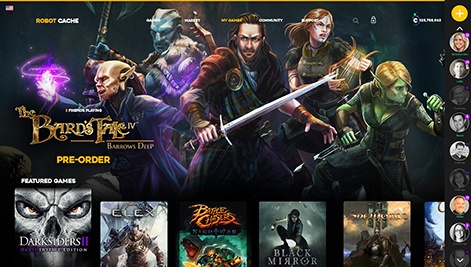Everyone in the games and tech press is sick of hearing about blockchain.
For the last 12 months, we've all received a ridiculous number of press releases about how this technology is going to change the world and add value to existing services. While we wish them all the best and hope these companies do great things, most of the time, the blockchain aspect appears to have been shoehorned in.
So when Brian Fargo announced blockchain-powered storefront Robot Cache earlier this year we rolled our eyes. But upon closer inspection, it does look like that company is onto something - which is to say it is higher than the frighteningly low bar for quality in this sector.
Robot Cache sells games which are tracked via blockchain tech and due to this, they can be resold safely. Publishers and developers take a cut from both brand new sales and second-hand sales - 95 and 70 per cent respectively - while consumers get 25 per cent of the proceeds from selling their games. The platform itself takes a five per cent slice.
The marketplace is launching in a beta form in October, so we'll be able to see then whether the company is all talk. Still, it's early days yet and CEO Lee Jacobson has reasonable expectations for the storefront.
"We're not silly enough to think we're going to attract all these hardcore Steam users, that's ridiculous," he explains.
"But there's a group of individuals that we think that maybe they haven't gravitated towards Steam yet and maybe they like the idea of monetising their games and selling them off. Maybe they like the idea of letting their miner go at night when they're asleep. Not everyone will get into it, but we have all the same badges and rewards that Steam does. It's different. We think there's time to change and mix up the platform."
We're not silly enough to think we're going to attract all these hardcore Steam users, that's ridiculous
When it comes to its design, Robot Cache has opted for a more minimalist approach to how it presents games. There's a Netflix-style scrolling system for titles on the homepage. The idea, Jacobson says, is to offer an experience that works across all platforms.
"We got a lot of feedback from gamers that using Steam's mobile interface isn't conducive to browsing content," he says.
"Most people were browsing on their phone or tablet but buying on their PC client. The reason we designed it this way is it's really mobile friendly, as well as a great experience on desktop. That was paramount. Secondly, we wanted to do was take games from indies and triple-A - everyone that we wanted to build an ecosystem around - and get consumers right in with a video showing you the game, just like Twitch or Netflix does. We didn't want this big cumbersome interface initially. We are trying to talk a delicate line between having enough information on the screen but also not overwhelming the user."

One of the big sells for publishers is that the use of blockchain in this instance acts as a form of DRM. Robot Cache is constantly tracking who owns what through the shared digital ledger, which makes piracy less of a concern.
"One of the reasons we have 30-something publishers on board is because the immutability of the rights management," Jacobson says.
"People will try and hack all day long but the product is traceable at the end of the day. Someone might come in a backdoor but I guarantee it's not going to be like Steam keys where you can download and hack all the Steam games. It's really core, and that's the reason why publishers gave us the rights to begin with. They can't dispute the immutability of the blockchain."
This tracking allows for consumers to easily be able to list their games on Robot Cache for sale. All it takes is one click.
"Users can still play it while it's listed for sale. Once the game is sold, it'll simply be removed from your library. It's not even hard," Jacobson explains.
"We do all the stuff on the back end. We'll make sure the buyer and seller get paired up, we'll transfer the rights of the contract on the blockchain, we'll record it for the publisher. All that stuff will be done and handled by us or gamers won't do it."
We're selective. The store is going to be curated. There are going to be no school shooter games, nothing like that at all on Robot Cache
The platform also features the option for users to be able to mine for Robot Cache's Ethereum Iron token, something that can be done if they leave their PC on overnight, for example. But Jacobson says that this is an opt-in feature as many consumers are - quite rightly - wary of anything to do with cryptocurrency.
"We've seen certain stories where certain browsers get hijacked with people downloading viruses and, without the user's permission and making them part of a massive client mine pool which is bullshit," he says.
"It's caused a lot of problems for a lot of people. We took the opposite approach, which is opting in rather than opting out and when you opt-in, it's going to clearly tell you that Robot Cache is going to mine Ethereum on the backside, convert that in bulk into Iron and that goes into your wallet. You can spend that on a new game. It's up to you. That was really our focus."
The platform will also be curated with Jacobson saying he doesn't want users to have to look through an excessive number of titles including, um, school shooting games.
"We're selective. The store is going to be curated. There are going to be no school shooter games, nothing like that at all on Robot Cache," he says.
"I wish I could tell you the exact approach about how we're going to do this, but right now we're going to look at all the games. Every game that gets submitted will be reviewed for content. You can put anything you want on Steam - people can download Unity assets of two characters fighting, put that up for $0.99 and call that a game. We're not going to put that game on Robot Cache."
He concludes: "I'm hoping we can learn and have a good curation process over time. I don't want people looking through 70,000 titles."
















